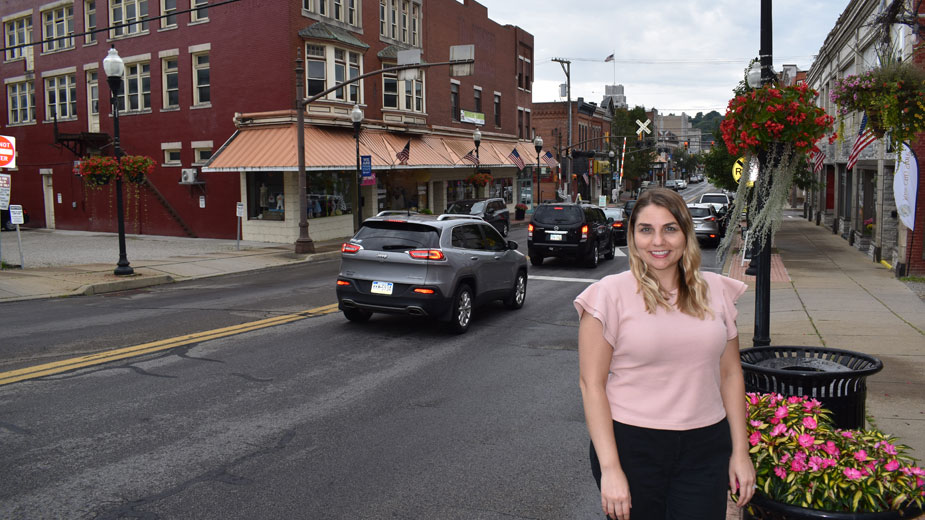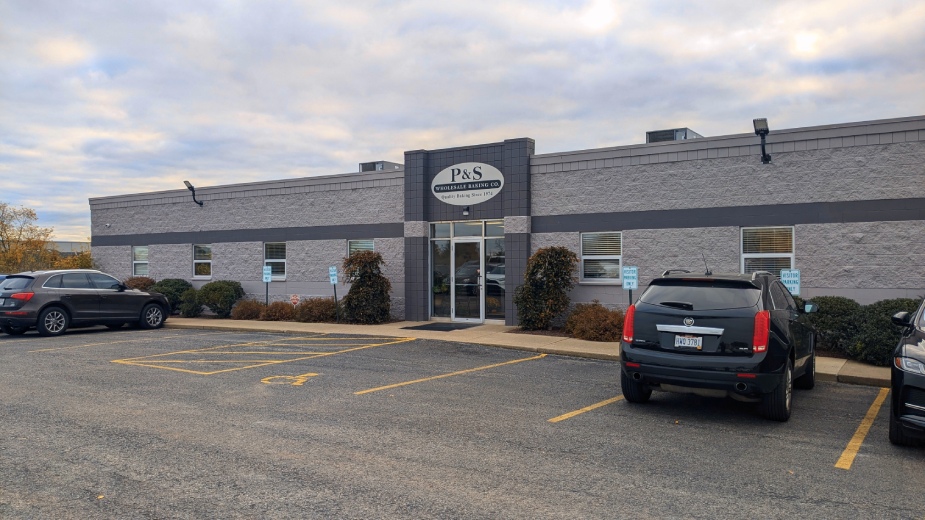City of Sharon Maps Its Revitalization
SHARON, Pa. – Nearly every chair is filled in Dave Pegg’s Barbering & Shave Parlor mid-morning in mid-August.
Owner Dave Pegg, who has operated his own barbershop for six years, opened a storefront in the Applegate Building in Sharon, Pa. this spring.
Business at the Sharpsville Avenue shop has been steady since the move, Pegg reports. “It stays busy. It’s been great,” he says.
“He’s doing very well. There’s a ton of foot traffic down there. It’s really an intimate but rustic-feeling barber shop,” says Riley Atterholt, development director for JCL Development, which owns the Applegate Building.
Redevelopment of the building – where a gift shop will join Pegg’s shop later this year, followed by a new restaurant set to open February – represents just one component of the public and private-sector efforts to revitalize downtown Sharon.
This month, consultants hired by the city will begin work on two studies, one focusing on developing a strategy for addressing blighted properties and the other exploring the feasibility of a neighborhood improvement district, reports Melissa Phillips, community and economic development director for the city of Sharon.
These studies follow a volunteer-led mapping initiative that took place last September. About 70 volunteers spread through the city and assessed each of the city’s buildings.
“The good news to come out of that is that overwhelmingly there were far more good and excellent structures than blighted property,” Phillips says.
Unfortunately, the blighted structures are the most noticeable ones so the bad “seems to outweigh the good, even though the numbers aren’t necessarily there,” Phillips concedes.
The blight study will be done through the Housing Alliance of Pennsylvania.
The city has designated an area bordered by Hull Street to the north, Jefferson Avenue to the east, East State Street to the south and Sharpsville Avenue to the west. Workers have made infrastructure improvements, including installation of a bike lane and curbing for sidewalks. And the city has taken down 15 houses, mostly held by owners who died, Phillips says.
Before the city can move forward on demolition, it goes through a “very substantial due diligence process” to identify the owner and give them or their estate the opportunity to remediate the property.
Sharon does its best to voluntarily care for the abandoned properties, which the city still doesn’t own, but “we don’t have enough employees to do that,” Phillips adds.
Using Trumbull Neighborhood Partnership and Youngstown Neighborhood Development Corp. as “inspiration” and conducting research on what other communities across the country are doing, the city has developed a “three-pronged approach” that is contingent on state approval.
One prong – the “preferred approach” – is a side lot program, in which a tax-paying property owner whose existing property is well cared for could be given the land. “We’re still in the development stage,” Phillips says.
Also being explored are projects such as community gardens or allowing residents to sponsor a lot, with the funds raised used to hire people to take care of the property.
“If the state approves, this will pay for the manager to kick these programs off,” Phillips says, as well as provide “funding to do some cool projects on the lots.”
There is interest in developing a land bank but the community lacks a plan for taking the concept into action steps. “The county would likely benefit from having an action strategy for the land bank, and that is something that this blight consultant could help with,” Phillips says.
Also on the list of ideas is bringing on a downtown manager, who would work with businesses, Phillips says. The downtown has “invaluable anchors” such as the Winner family, which has developed several downtown properties, and JCL Development, as well as “some really unique mom-and-pops” such as Never Enough Yarn, which draws customers from across the region.
Sharon is following the four-point approach of the Main Street America program – Economic Vitality, Design, Promotion and Organization – “a model that’s worked time and time again in communities,” Phillips says. The city will work with a consultant from the Pennsylvania Downtown Center to develop a five-year plan, then apply to the national Main Street organization for recognition of its plan.
The state would also recognize that Sharon has a Main Street-approved plan, which would open doors to funding the downtown manager. Municipalities have used funding from the program for establishing small-business loan accounts that provide operating capital to support a company’s growth, for façade improvements or for staging public events.
“It could be something that I’m not thinking of that small business owners might need that we don’t know they need,” Phillips says. “The issue with our capacity right now is we’re not able to serve the small-business owners in the way that we would like to.”
Although the city has some ideas about what business owners need, the downtown manager would serve as a “point person to find out the real needs and wants of the community,” Phillips says.
The Shenango Valley Chamber is “absolutely in support” of the plans the city is pursuing, particularly when it comes to the proposed downtown manager. Downtowns are “huge assets for revitalization and for attracting the next generation of young professionals,” says Sherris Moreira, executive director.
It’s a position shared by JCL Development President Jim Landino.
“He’s investing a lot of time and money,” Moreira says.
“We’re trying to get this next generation to live, work and eat downtown,” JCL’s Atterholt says.
This fall, five market-rate apartments will be completed in the Buhl Armory building, he reports. Of those, four are leased, all to individuals under the age of 30. One of the four future tenants is Breanna Griffin, owner of Anytime Fitness, who is moving her fitness studio to a space JCL is renovating in the Carine Co. building, which JCL bought about two years ago.
Sharpsville Avenue, on which the Buhl Armory is located, is a focus area for JCL, Atterholt says. In the Applegate Building, where Pegg’s Barbering operates, JCL is building out space for Gifted, a gift and boutique shop operated by Jen Krezeczowski, owner of Lulu Beans Café & Coffee House, Atterholt says.

Plans are for the store, which will feature items from western Pennsylvania and eastern Ohio including ceramics, jewelry and art, to open in time for the holiday shopping season.
Applegate North, which Atterholt describes as an American artisan restaurant, is expected to open in February. The restaurant will be operated by New Castle chef Sam Michael, who formerly operated Palate there.
“We’re excited to see what he can deliver,” Atterholt says.
Lulu Beans, which opened last year and is “hitting its stride,” began selling alcoholic beverages in June and is working on growing its dinner crowd, part of a push to show “downtown Sharon doesn’t shut off at 5 o’clock,” he says.
“We’re trying to stabilize blocks,” Landino adds. JCL, which already owns the former Vocal Group Hall of Fame building and the Owsley Building, has the former Brewtus property and the building owned by Penn-Northwest Development Corp. under contract.
JCL is “trying to master plan” the entire Chestnut block, although that doesn’t mean the company is “looking to own and operate everything” in Sharon, Atterholt says.
JCL’s primary interest is to stabilize properties and prepare them for development.
“We’re looking for potentially an investor to come in and partner on the project,” he says.
Other downtown projects Landino is considering include a drive-thru coffee shop for locals to patronize rather than one of the chain coffee shops. “It’s a concept right now,” JCL’s president says “We have to find out whether people will support it.”
“We’re trying to keep Sharon as a boutique,” and let chains and big-box retailers gravitate to neighboring Hermitage, Landino says. Sharon “has a very different vibe.”
Pegg is among those satisfied with the approach taken by Landino, Krezeczowski and others. “Jim and Jen and everybody are doing amazing things in town,” he affirms.
“Community development and economic development are inextricably linked,” Phillips says. “We are not going to create a more sustainable economy until we have the kinds of communities that businesses want to relocate to, and those quality of life indicators are imperative.”
Pictured: Melissa Phillips is the Sharon’s community and economic development director.
Copyright 2024 The Business Journal, Youngstown, Ohio.



